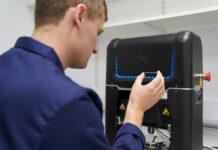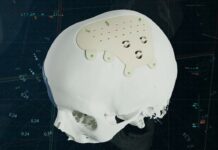Gecko, a French medical company received €6 million for its project proposal entitled “PIAVE” [Projets Industriels d’Avenir (Promising Industrial Projects)]. Coordinated by the General Secretariate for Investment (SGPI) and operated by Bpifrance, the company developed an exclusive platform of polymers allowing for tissue reconstruction.
The synthetic polymers are biocompatible, bioresorbable, and activated by a specific type of light. Useful during surgical procedures (acting like an adhesive, a barrier or a filler product, depending on the type of surgery), and onto internal tissues, they are 3D printable. Therefore, they enable the production of flexible, bioresorbable and very high-resolution implants.
As far as the funding is concerned, it will provide support for the industrialization of Gecko’s polymers platform, as well as for the development of a new, innovative program that will enable the reconstruction of peripheral nerves, without sutures, using 3D-printed micro-conducts secured by one of the company’s exclusive adhesives.
Christophe Bancel, CEO of Gecko Biomedical, said: “This funding will allow us to speed up our industrialization process and equip ourselves with a globally unique manufacturing site. Cutting-edge processes will be performed on this site to produce all our liquid polymers in individual, sterile conditions, ready for use by surgeons. We also intend to speed up a second phase in our strategy through the industrial and clinical development of our 3D printing platform for flexible, bioresorbable and high-resolution implants, by leveraging our polymers as a biomedical resin, as well as by optimising state-of-the-art 3D printing techniques”.
Polymer, an essential material?
Notice is to be made that a wide range of studies involve the use of polymers. Its characteristics enable researchers to exploit it for a wide range of fields including medicine, or 3D printing. Recently for instance, researchers discovered that the mix of two different polymer forms can switch manufacturing of silicone parts from molding, casting and spin coating of simple forms to 3D printing of complex geometries. These geometries integrate better mechanical characteristics and biological adhesion.
For further information about 3D Printing, follow us on our social networks and subscribe to our newsletter!






